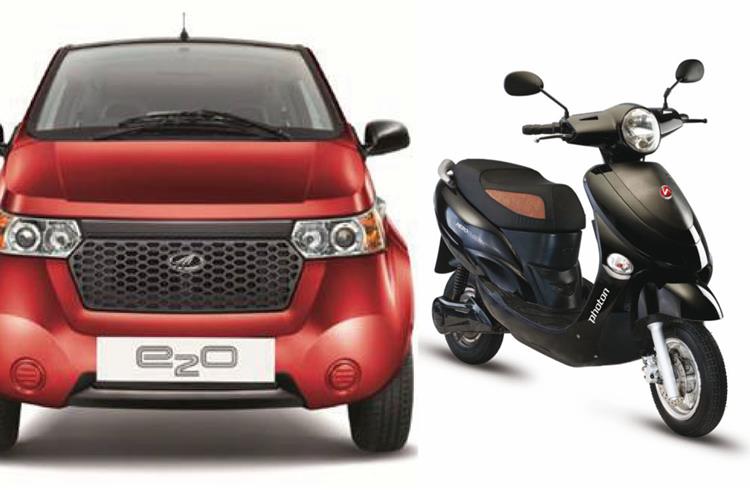Indian EV industry plugs for changes in Union Budget
With a vision of producing nearly six to seven million electric vehicles – both four-wheelers and two-wheelers – in India by 2020,
With a vision of producing nearly six to seven million electric vehicles – both four-wheelers and two-wheelers – in India by 2020, and to help the industry come out unscathed from its current difficult phase, the Society of Manufacturers of Electric Vehicles (SMEV), a nodal agency for the electric vehicle industry in India has appealed to the government for its support.
SMEV has identified some key issues which will require government’s intervention in terms of making strategic policies, announcements and fund allocations in the upcoming Union Budget 2015-2016, which is to be presented on February 28.
At present, the e-vehicle industry In India is battling for survival. This, SMEV says, has brought down the number of players to 5 from 28 and more than 400 dealerships have been shut. “The National Electric Mobility Mission Plan 2020 (NEMMP 2020) which was rolled out in 2013 showed a ray of hope to the e-vehicle industry, but could not be implemented yet. We expect the forthcoming Budget to create a favourable and stable policy environment to revive the industry and help in promoting the growth of the e-vehicle industry,” says Sohinder Gill, director, Corporate Affairs, SMEV.
Some of the SMEV’s expectations from the government are:
Early implementation of NEMMP
NEMMP has been delayed by more than a year and that has led to the entire EV industry collapsing. The number of players has come down to 5 from 28, more than 400 dealerships have been closed down leading to a loss of livelihood for more than 20,000 persons. Investment of over Rs 300 crore has been wasted and the capacity utilisation of even the active players has come down to only 5 percent. “Budget 2015 is the last hope of pulling the sick industry out of the ICU and if NEMMP is not implemented immediately, the industry is likely to collapse totally making it almost impossible to resurrect it. There is news that an interim Rs 1,000 crore is being announced under NEMMP but there is no official communication to this effect,” says Gill.
Reduction of VAT to zero percent on EVs
Although the Central Government has notified under the environmental laws that no VAT should be charged on all electric vehicles and a few states like Delhi, Uttarakhand and Rajasthan are following the guideline, states like Punjab, Uttar Pradesh , Bihar and Goa are charging ad-hoc VAT 12.5 percent to 14.3 percent on EVs. SMEV wants VAT to be brought down to zero by issuing strict guidelines to the non-conforming states.
Continuation of 6 percent excise duty on EV industry
It is believed that government is considering reducing the excise duty from 6 percent to 0 percent on EVs. SMEV says that while looks to be a good move, it will in fact harm the industry. SMEV wants excise duty to remain unchanged at 6 percent. If brought down to zero, genuine manufacturers who pay excise duty on input material will not be able to avail the MODVAT benefits.
Reduction of road tax up to zero percent on electric vehicles
This tax also increases the price of the EVs by up to 6 percent. A few states like West Bengal and Delhi have reduced the road tax or made it zero to encourage adoption of EVs but many others are charging the same road tax as for the liquid fuel vehicles. SMEV expects the finance minister to issue guidelines to states to abolish the road tax entry tax, octroi being levied on electric vehicles. However states like Uttarakhand and Rajasthan don’t charge such taxes, and such practices should be encouraged across India, says SMEV.
Continuation of 6 percent import duty on CKD and local components
The import duty on CKD (Completely Knocked Down) units and local components was changed two years back after discussion with SMEV. The import duty on powertrain components incorporating advance technology (which are still not produced in India) was reduced to 6 percent and for mechanical and other items it was increased to 28 percent. This was a good move and must be continued at least for a period of 3 years giving time and space for the Indian industry to grow and start producing world-class powertrain components.
RELATED ARTICLES
Bosch hydrogen engine tech-powered truck to be on Indian roads this year
The global supplier of technology and services is betting big on both electromobility and hydrogen. While announcing the...
IIT Bombay inaugurates Arun Firodia Research Floor
IIT Bombay, one of India’s top technical and research institutions, honours Kinetic Group chairman Dr Arun Firodia, one ...
Maruti Suzuki expands capacity at Manesar plant by additional 100,000 units
New assembly line at Plant A expands total manufacturing capacity at the Manesar plants to 900,000 units per annum. Alon...





 By Autocar Pro News Desk
By Autocar Pro News Desk
 20 Feb 2015
20 Feb 2015
 3749 Views
3749 Views









